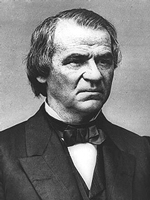|
Digital History>Topics>Historiography
Should Andrew Johnson have been impeached?
Digital
History TOPIC ID 105
 Andrew Johnson was the first American president ever to be impeached. He escaped conviction and removal from office by a single vote. Andrew Johnson was the first American president ever to be impeached. He escaped conviction and removal from office by a single vote.
Was Johnson's only crime, as many white Southerners insisted, a principled defiance of vengeful and fanatic Republican radicals? Or was he a villain, as his critics charged, who undermined efforts to protect the civil rights of the freedmen and who fueled Southern resistance to Reconstruction?
From an impoverished childhood, Johnson succeeded against enormous odds in raising himself up to the highest office in the land. He was truly a self-made man. He was born in 1808 in Raleigh, North Carolina, to illiterate parents. At the age of three, his father, a janitor, died. At ten, Johnson was apprenticed to a tailor, but at the age of fifteen he ran away to poor, rocky east Tennessee. He then married and opened a tailor shop. He never attended a single day of school. At the age of twenty-one, he entered politics. He was elected alderman, mayor, state senator, congressman, governor and U.S. Senator. A Democrat, he championed the common man against planter and banking and poor east Tennessee against the more fertile western lowlands.
Declared Johnson:
Some day I will show the stuck-up aristocrats who is running the country. A cheap purse-proud set they are, not half as good as the man who earns his bread by the sweat of the brow.
The only Southern senator to remain loyal to the Union during the Civil War, Johnson served as military governor of Tennessee after Union troops took over the state. In 1863, Johnson openly called for the abolition of slavery. Because Johnson was a staunch unionist and a Democrat, Lincoln chose him as his running mate in 1864 in order to broaden his base of appeal. Lincoln's assassination made Johnson president.
At first, Johnson adopted a harsh attitude toward the South, declaring that "traitors must be impoverished....They must not only be punished, but their social power must be destroyed." He offered rewards for the capture of Jefferson Davis and other Confederate officials and when he declared an amnesty, he announced that leading Confederates would have to appeal personally to him for a pardon. Soon, Johnson's position softened. He pardoned 13,000 Confederate officials whom he had earlier labeled traitors, restoring their property and political rights. The Southern state proceeded to elect many of these ex-Confederates to state office. Others were named to leadership positions in state militias. Nine were elected to the U.S. Congress, including Alexander Stephens, the former Confederate Vice President.
Encouraged by the President's actions, Mississippi refused to ratify the 13th Amendment abolishing slavery, South Carolina refused to repudiate its Civil War debts, and several Southern states refused to condemn their acts of secession. One state convention declared that its was a "Government of White People, made and to be perpetuated for the exclusive benefit of the White Race." Soon, Johnson began directly battling Republican members of Congress. He vetoed every civil rights bill passed by Congress, opposed the fourteenth amendment, and used his executive powers to obstruct Congressional Reconstruction.
The fact is that Johnson, despite his opposition to secession was also a lifelong Southerner and a Democrat, who was a committed supporter of slavery, white supremacy, and of states' rights. "This is a country for white men," he declared in 1865, "and by God, as long as I am President, it shall be a government for white men." A deeply bigoted man, he was determined to stop Congressional Reconstruction in order to prevent "the subjugation of the States to negro [sic] domination."
|
